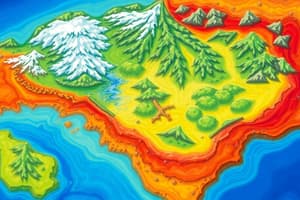Podcast
Questions and Answers
Which of the following best describes the climate in equatorial regions?
Which of the following best describes the climate in equatorial regions?
- High temperatures, lots of precipitation, and abundant vegetation. (correct)
- Hot and dry with large desert areas.
- Low temperatures and short vegetation periods.
- High temperatures with little precipitation.
What factor does NOT affect climate creation?
What factor does NOT affect climate creation?
- Atmosphere
- Oceans
- Biosphere
- Population density (correct)
Which climate region is known for its diverse mild weather that is favorable for human settlement?
Which climate region is known for its diverse mild weather that is favorable for human settlement?
- Temperate regions (correct)
- Polar regions
- Tropical regions
- Subtropical regions
What is the term for the height of an object above sea level?
What is the term for the height of an object above sea level?
Which feature is associated with polar regions?
Which feature is associated with polar regions?
Flashcards
Climate
Climate
The average weather conditions of a specific region over a long period of time.
Latitude
Latitude
The distance of a place north or south of the equator. It determines the amount of direct sunlight received.
Topography
Topography
The arrangement of natural and artificial features of an area, including mountains, valleys, and rivers.
Elevation
Elevation
Signup and view all the flashcards
Precipitation
Precipitation
Signup and view all the flashcards
Study Notes
Climate Zones
- Earth's climate zones are determined by the angle of the sun's rays.
- Regions near the equator receive more direct sunlight, resulting in higher temperatures.
- Regions closer to the poles receive less direct sunlight, resulting in lower temperatures.
- Climate zones vary based on latitude and elevation.
Climate Factors
- Climates are the prevailing weather conditions over a long period.
- Factors that influence climate formation include: atmosphere, oceans, land, ice, and the biosphere.
- Elevation and latitude also play significant roles in determining climate.
Climate Characteristics
- Regions near the equator experience high temperatures and abundant precipitation, often with lush vegetation.
- Regions near the poles have consistently low temperatures, with vegetation limited to short periods of the year.
- Tropical regions often include hot deserts due to dry climates.
- The temperate climate is favored for settlement due to its variety of mild weather and vegetation.
Latitude and Climate
- Latitude is the distance north or south of the Earth's equator.
- Latitude directly influences the angle of incoming sunlight, and subsequently, temperature and climate patterns.
Elevation and Climate
- Elevation is the height of a location relative to sea level.
- As elevation increases, temperature tends to decrease.
- Elevation can significantly affect local climate patterns.
Earth's Climate Regions
- Close to the equator, climates are generally warm with abundant precipitation and vegetation.
- Regions closer to the poles have colder climates, with vegetation present during short periods.
- Deserts are climate types dominated by dry conditions.
- Temperate climates are favorable for settlement.
Studying That Suits You
Use AI to generate personalized quizzes and flashcards to suit your learning preferences.




